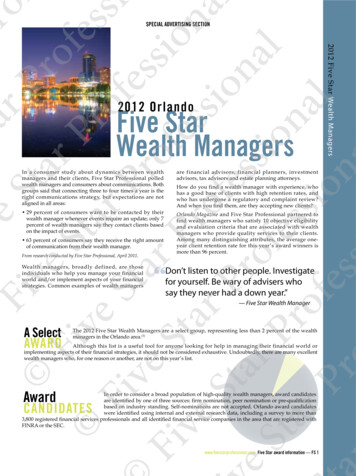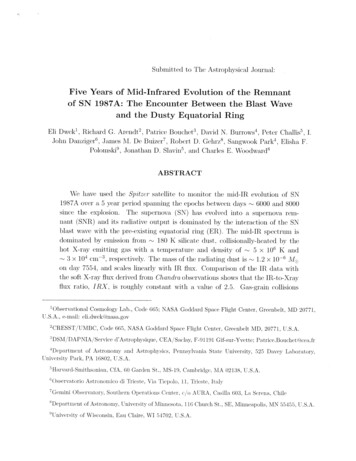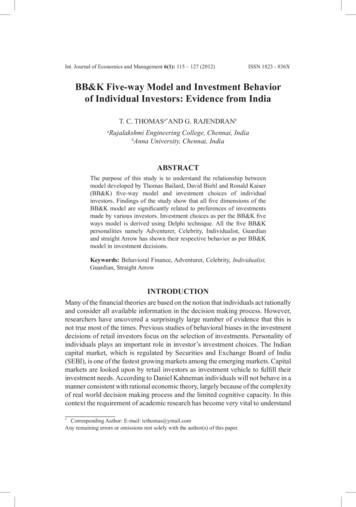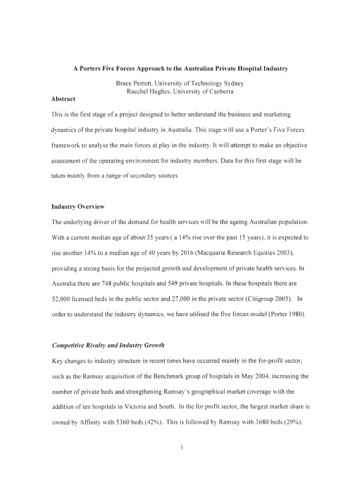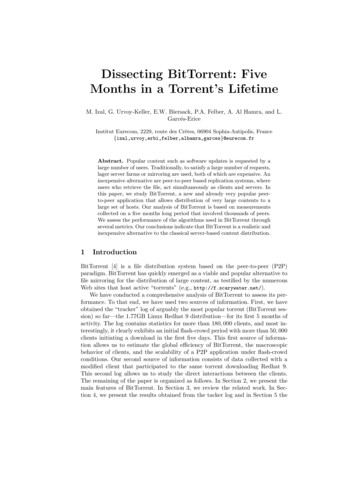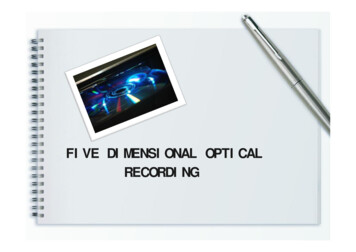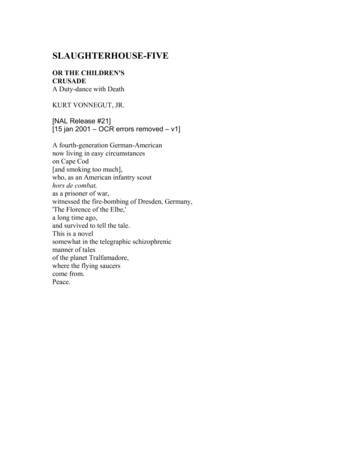
Transcription
SLAUGHTERHOUSE-FIVEOR THE CHILDREN'SCRUSADEA Duty-dance with DeathKURT VONNEGUT, JR.[NAL Release #21][15 jan 2001 – OCR errors removed – v1]A fourth-generation German-Americannow living in easy circumstanceson Cape Cod[and smoking too much],who, as an American infantry scouthors de combat,as a prisoner of war,witnessed the fire-bombing of Dresden, Germany,'The Florence of the Elbe,'a long time ago,and survived to tell the tale.This is a novelsomewhat in the telegraphic schizophrenicmanner of talesof the planet Tralfamadore,where the flying saucerscome from.Peace.
Granada Publishing LimitedPublished in 1972 by Panther Books LtdFrogmore, St Albans, Herts AL2 2NFReprinted 1972, 1973 (twice), 1974, 1975First published in Great Britain by Jonathan Cape Ltd 1970Copyright (D Kurt Vonnegut Jr. 1969Made and printed in Great Britain byRichard Clay (The Chaucer Press) LtdBungy, SuffolkSet in Linotype PlantinThis book is sold subject to the condition that it shall not, by way of trade or otherwise,be lent, re-sold, hired out or otherwise circulated without the publisher's prior consent inany form of binding or cover other than that in which it is published and without a similarcondition including this condition being imposed on the subsequent purchaser.This book is published at a net price and is supplied subject to the Publishers AssociationStandard Conditions of Sale registered under the Restrictive Trade Practices Act, 1956.Grateful acknowledgment is made for permission to reprint the following material:'The Waking': copyright 1953 by Theodore Roethke fromTHE COLLECTED POEMS OF THEODORE ROETHKEprinted by permission of Doubleday & Company, Inc.THE DESTRUCTION OF DRESDEN by David Irving:From the Introduction by Ira C. Eaker, Lt. Gen. USAF (RET.) and Foreword by AirMarshall Sir Robert Saundby. Copyright 1963 by William Kimber and Co. Limited.Reprinted by permission of Holt, Rinehart and Winston, Inc. and William Kimber andCo. Limited.'Leven Cent Cotton' by Bob Miller and Emma Dermer: Copyright 1928, 1929 by MCAMusic, a Division of MCA Inc. Copyright renewed 1955,1956 and assigned to MCAMusic, a division of MCA Inc. Used by permission.
forMary O’HareandGerhard Müller
The cattle are lowing,The Baby awakes,But the little Lord JesusNo crying He makes.
OneAll this happened, more or less. The war parts, anyway, are pretty much true. One guy Iknew really was shot in Dresden for taking a teapot that wasn't his. Another guy I knewreally did threaten to have his personal enemies killed by hired gunmen after the war.And so on. I've changed all the names.I really did go back to Dresden with Guggenheim money (God love it) in 1967. Itlooked a lot like Dayton, Ohio, more open spaces than Dayton has. There must be tons ofhuman bone meal in the ground.I went back there with an old war buddy, Bernard V. O'Hare, and we made friendswith a taxi driver, who took us to the slaughterhouse where we had been locked up atnight as prisoner of war. His name was Gerhard Müller. He told us that he was a prisonerof the Americans for a while. We asked him how it was to live under Communism, andhe said that it was terrible at first, because everybody had to work so hard, and becausethere wasn't much shelter or food or clothing. But things were much better now. He had apleasant little apartment, and his daughter was getting an excellent education. His motherwas incinerated in the Dresden fire-storm. So it goes.He sent O'Hare a postcard at Christmastime, and here is what it said:'I wish you and your family also as to your friend Merry Christmas and a happy NewYear and I hope that we'll meet again in a world of peace and freedom in the taxi cab ifthe accident will.'I like that very much: 'If the accident will.'I would hate to tell you what this lousy little book cost me in money and anxiety andtime. When I got home from the Second World War twenty-three years ago, I thought itwould be easy for me to write about the destruction of Dresden, since all I would have todo would be to report what I had seen. And I thought, too, that it would be a masterpieceor at least make me a lot of money, since the subject was so big.But not many words about Dresden came from my mind then-not enough of them tomake a book, anyway. And not many words come now, either, when I have become anold fart with his memories and his Pall Malls, with his sons full grown. I think of howuseless the Dresden-part of my memory has been, and yet how tempting Dresden hasbeen to write about, and I am reminded of the famous limerick:There was a young man from Stamboul,Who soliloquized thus to his tool,'You took all my wealthAnd you ruined my health,And now you won't pee, you old fool’And I'm reminded, too, of the song that goesMy name is Yon Yonson,I work in Wisconsin,I work in a lumbermill there.The people I meet when I walk down the street,They say, 'What's your name?
And I say,‘My name is Yon Yonson,I work in Wisconsin.And so on to infinity.Over the years, people I've met have often asked me what I'm working on, and I'veusually replied that the main thing was a book about Dresden.I said that to Harrison Starr, the movie-maker, one time, and he raised his eyebrowsand inquired, 'Is it an anti-war book?''Yes,' I said. 'I guess.''You know what I say to people when I hear they're writing anti-war books?''No. What do you say, Harrison Starr?''I say, "Why don't you write an anti-glacier book instead?"'What he meant, of course, was that there would always be wars, that they were as easyto stop as glaciers. I believe that too.And, even if wars didn't keep coming like glaciers, there would still be plain old death.When I was somewhat younger, working on my famous Dresden book, I asked an oldwar buddy named Bernard V. O'Hare if I could come to see him. He was a districtattorney in Pennsylvania. I was a writer on Cape Cod. We had been privates in the war,infantry scouts. We had never expected to make any money after the war, but we weredoing quite well.I had the Bell Telephone Company find him for me. They are wonderful that way. Ihave this, disease late at night sometimes, involving alcohol and the telephone. I getdrunk, and I drive my wife away with a breath like mustard gas and roses. And then,speaking gravely and elegantly into the telephone, I ask the telephone operators toconnect me with this friend or that one, from whom I have not heard in years.I got O'Hare on the line in this way. He is short and I am tall. We were Mutt and Jeff inthe war. We were captured together in the war. I told him who I was on the telephone. Hehad no trouble believing it. He was up. He was reading. Everybody else in his house wasasleep.'Listen,' I said, 'I'm writing this book about Dresden. I'd like some help rememberingstuff. I wonder if I could come down and see you, and we could drink and talk andremember.'He was unenthusiastic. He said he couldn't remember much. He told me, though, tocome ahead.'I think the climax of the book will be the execution of poor old Edgar Derby,' I said.'The irony is so great. A whole city gets burned down, and thousands and thousands ofpeople are killed. And then this one American foot soldier is arrested in the ruins fortaking a teapot. And he's given a regular trial, and then he's shot by a firing squad.''Um,' said O'Hare.'Don't you think that's really where the climax should come?' 'I don't know anythingabout it,' he said. 'That's your trade, not mine.'
As a trafficker in climaxes and thrills and characterization and wonderful dialogue andsuspense and confrontations, I had outlined the Dresden story many times. The bestoutline I ever made, or anyway the prettiest one, was on the back of a roll of wallpaper.I used my daughter's crayons, a different color for each main character. One end of thewallpaper was the beginning of the story, and the other end was the end, and then therewas all that middle part, which was the middle. And the blue line met the red line andthen the yellow line, and the yellow line stopped because the character represented by theyellow line was dead. And so on. The destruction of Dresden was represented by avertical band of orange cross-hatching, and all the lines that were still alive passedthrough it, came out the other side.The end, where all the lines stopped, was a beetfield on the Elbe, outside of Halle. Therain was coming down. The war in Europe had been over for a couple of weeks. We wereformed in ranks, with Russian soldiers guarding us-Englishmen, Americans, Dutchmen,Belgians, Frenchmen, Canadians, South Africans, New Zealanders, Australians,thousands of us about to stop being prisoners of war.And on the other side of the field were thousands of Russians and Poles andYugoslavians and so on guarded by American soldiers. An exchange was made there inthe rain-one for one. O'Hare and I climbed into the back of an American truck with a lotof others. O'Hare didn't have any souvenirs. Almost everybody else did. I had aceremonial Luftwaffe saber, still do. The rabid little American I call Paul Lazzaro in thisbook had about a quart of diamonds and emeralds and rubies and so on' He had takenthese from dead people in the cellars of Dresden.' So it goes.An idiotic Englishman, who had lost all his teeth somewhere had his souvenir in acanvas bag. The bag was resting on my insteps. He would peek into the bag every nowand then, and he would roll his eyes and swivel his scrawny neck,, trying to catch peoplelooking covetously at his bag. And he would bounce the bag on my insteps.I thought this bouncing was accidental. But I was mistaken. He had to show somebodywhat was in the bag, and he had decided he could trust me. He caught my eye, winked,opened the bag. There was a plaster model of the Eiffel Tower in there. It was paintedgold. It had a clock in it.'There's a smashin' thing,' he said.And we were flown to a rest camp in France, where we were fed chocolate maltedmilkshakes and other rich foods until we were all covered with baby fat. Then we weresent home, and I married a pretty girl who was covered with baby fat, too.And we had babies.And they're all grown up now, and I'm an old fart with his memories and his PallMalls. My name is Yon Yonson, I work in Wisconsin, I work in a lumbermill there.Sometimes I try to call up old girl friends on the telephone late at night, after my wifehas gone to bed. 'Operator, I wonder if you could give me the number of a Mrs. So-andSo. I think she lives at such-and-such.''I'm sorry, sir. There is no such listing.''Thanks, Operator. Thanks just the same.'And I let the dog out or I let him in, and we talk some. I let him know I like him, andhe lets me know he likes me. He doesn't mind the smell of mustard gas and roses.'You're all right, Sandy, I'll say to the dog. 'You know that, Sandy? You're O.K.'
Sometimes I'll turn on the radio and listen to a talk program from Boston or New York.I can't stand recorded music if I've been drinking a good deal.Sooner or later I go to bed, and my wife asks me what time it is. She always has toknow the time. Sometimes I don't know, and I say, 'Search me.'I think about my education sometimes. I went to the University of Chicago for a whileafter the Second World War. I was a student in the Department of Anthropology. At thattime, they were teaching that there was absolutely no difference between anybody. Theymay be teaching that still.Another thing they taught was that nobody was ridiculous or bad or disgusting. Shortlybefore my father died, he said to me, 'You know-you never wrote a story with a villain init.'I told him that was one of the things I learned in college after the war.While I was studying to be an anthropologist, I was also working as a police reporterfor the famous Chicago City News Bureau for twenty-eight dollars a week. One time theyswitched me from the night shift to the day shift., so I worked sixteen hours straight. Wewere supported by all the newspapers in town, and the AP and the UP and all that. Andwe would cover the courts and the police stations and the Fire Department and the CoastGuard out on Lake Michigan and all that. We were connected to the institutions thatsupported us by means of pneumatic tubes which ran under the streets of Chicago.Reporters would telephone in stories to writers wearing headphones, and the writerswould stencil the stories on mimeograph sheets. The stories were mimeographed andstuffed into the brass and velvet cartridges which the pneumatic tubes ate. The verytoughest reporters and writers were women who had taken over the jobs of men who'dgone to war.And the first story I covered I had to dictate over the telephone to one of those beastlygirls. It was about a young veteran who had taken a job running an old-fashioned elevatorin an office building. The elevator door on the first floor was ornamental iron lace. Ironivy snaked in and out of the holes. There was an iron twig with two iron lovebirdsperched upon it.This veteran decided to take his car into the basement, and he closed the door andstarted down, but his wedding ring Was caught in all the ornaments. So he was hoistedinto the air and the floor of the car went down, dropped out from under him, and the topof the car squashed him. So it goes.So I phoned this in, and the woman who was going to cut the stencil asked me. 'Whatdid his wife say?''She doesn't know yet,' I said. 'It just happened.''Call her up and get a statement.''What?''Tell her you're Captain Finn of the Police Department. Say you have some sad news.Give her the news, and see what she says.'So I did. She said about what you would expect her to say. There was a baby. And soon.When I got back to the office, the woman writer asked me, just for her owninformation, what the squashed guy had looked Eke when he was squashed.
I told her.'Did it bother you?' she said. She was eating a Three Musketeers Candy Bar.'Heck no, Nancy,' I said. 'I've seen lots worse than that in the war.'Even then I was supposedly writing a book about Dresden. It wasn't a famous air raidback then in America. Not many Americans knew how much worse it had been thanHiroshima, for instance. I didn't know that, either. There hadn't been much publicity.I happened to tell a University of Chicago professor at a cocktail party about the raid asI had seen it, about the book I would write. He was a member of a thing called TheCommittee on Social Thought. And he told me about the concentration camps, and abouthow the Germans had made soap and candles out of the fat of dead Jews and so on.All could say was, 'I know, I know. I know.'The Second World War had certainly made everybody very tough. And I became apublic relations man for General Electric in Schenectady, New York, and a volunteerfireman in the Village of Alplaus, where I bought my first home. My boss there was oneof the toughest guys I ever hope to meet. He had been a lieutenant colonel in publicrelations in Baltimore. While I was in Schenectady he joined the Dutch ReformedChurch, which is a very tough church, indeed.He used to ask me sneeringly sometimes why I hadn't been an officer, as though I'ddone something wrong.My wife and I had lost our baby fat. Those were our scrawny years. We had a lot ofscrawny veterans and their scrawny wives for friends. The nicest veterans inSchenectady, I thought, the kindest and funniest ones, the ones who hated war the most,were the ones who'd really fought.I wrote the Air Force back then, asking for details about the raid on Dresden, whoordered it, how many planes did it, why they did it, what desirable results there had beenand so on. I was answered by a man who, like myself, was in public relations. He saidthat he was sorry, but that the information was top secret still.I read the letter out loud to my wife, and I said, 'Secret? My God-from whom?'We were United World Federalists back then. I don't know what we are now.Telephoners, I guess. We telephone a lot-or I do, anyway, late at night.A couple of weeks after I telephoned my old war buddy, Bernard V. O'Hare, I reallydid go to see him. That must have been in 1964 or so-whatever the last year was for theNew York World's Fair. Eheu, fugaces labuntur anni. My name is Yon Yonson. Therewas a young man from Stamboul.I took two little girls with me, my daughter, Nanny, and her best friend, AllisonMitchell. They had never been off Cape Cod before. When we saw a river, we had to stopso they could stand by it and think about it for a while. They had never seen water in thatlong and narrow, unsalted form before. The river was the Hudson. There were carp inthere and we saw them. They were as big as atomic submarines.We saw waterfalls, too, streams jumping off cliffs into the valley of the Delaware.There were lots of things to stop and see-and then it was time to go, always time to go.
The little girls were wearing white party dresses and black party shoes, so strangerswould know at once how nice they were. 'Time to go, girls,' I'd say. And we would go.And the sun went down, and we had supper in an Italian place, and then I knocked onthe front door of the beautiful stone house of Bernard V. O'Hare. I was carrying a bottleof Irish whiskey like a dinner bell.I met his nice wife, Mary, to whom I dedicate this book. I dedicate it to GerhardMüller, the Dresden taxi driver, too. Mary O'Hare is a trained nurse, which is a lovelything for a woman to be.Mary admired the two little girls I'd brought, mixed them in with her own children,sent them all upstairs to play games and watch television. It was only after the childrenwere gone that I sensed that Mary didn't like me or didn't like something about the night.She was polite but chilly.'It's a nice cozy house you have here,' I said, and it really was.'I've fixed up a place where you can talk and not be bothered,' she said.'Good,' I said, and I imagined two leather chairs near a fire in a paneled room, wheretwo old soldiers could drink and talk. But she took us into the kitchen. She had put twostraight-backed chairs at a kitchen table with a white porcelain top. That table top wasscreaming with reflected light from a two-hundred-watt bulb overhead. Mary hadprepared an operating room. She put only one glass on it, which was for me. Sheexplained that O'Hare couldn't drink the hard stuff since the war.So we sat down. O'Hare was embarrassed, but he wouldn't tell me what was wrong. Icouldn't imagine what it was about me that could bum up Mary so. I was a family man.I'd been married only once. I wasn't a drunk. I hadn't done her husband any dirt in thewar.She fixed herself a Coca-Cola, made a lot of noise banging the ice-cube tray in thestainless steel sink. Then she went into another part of the house. But she wouldn't sitstill. She was moving all over the house, opening and shutting doors, even movingfurniture around to work off anger.I asked O'Hare what I'd said or done to make her act that way.'It's all right,' he said. "Don't worry about it. It doesn't have anything to do with you.'That was kind of him. He was lying. It had everything to do with me.So we tried to ignore Mary and remember the war. I took a couple of belts of thebooze I'd brought. We would chuckle or grin sometimes, as though war stories werecoming back, but neither one of us could remember anything good. O'Hare rememberedone guy who got into a lot of wine in Dresden, before it was bombed, and we had to takehim home in a wheelbarrow.It wasn't much to write a book about. I remembered two Russian soldiers who hadlooted a clock factory. They had a horse-drawn wagon full of clocks. They were happyand drunk. They were smoking huge cigarettes they had rolled in newspaper.That was about it for memories, and Mary was still making noise. She finally cameout in the kitchen again for another Coke. She took another tray of ice cubes from therefrigerator, banged it in the sink, even though there was already plenty of ice out.Then she turned to me, let me see how angry she was, and that the anger was for me.She had been talking to herself, so what she said was a fragment of a much largerconversation. "You were just babies then!' she said.'What?" I said.
'You were just babies in the war-like the ones upstairs! 'I nodded that this was true. We had been foolish virgins in the war, right at the end ofchildhood.'But you're not going to write it that way, are you.' This wasn't a question. It was anaccusation.'I-I don't know,' I said.'Well, I know,' she said. 'You'll pretend you were men instead of babies, and you'll beplayed in the movies by Frank Sinatra and John Wayne or some of those otherglamorous, war-loving, dirty old men. And war will look just wonderful, so we'll have alot more of them. And they'll be fought by babies like the babies upstairs.'So then I understood. It was war that made her so angry. She didn't want her babies oranybody else's babies killed in wars. And she thought wars were partly encouraged bybooks and movies.So I held up my right hand and I made her a promise 'Mary,' I said, 'I don't think thisbook is ever going to be finished. I must have written five thousand pages by now, andthrown them all away. If I ever do finish it, though, I give you my word of honor: therewon't be a part for Frank Sinatra or John Wayne.'I tell you what,' I said, 'I'll call it The Children's Crusade.'She was my friend after that.O'Hare and I gave up on remembering, went into the living room, talked about otherthings. We became curious about the real Children's Crusade, so O'Hare looked it up in abook he had, Extraordinary Popular Delusions and the Madness of Crowds, by CharlesMackay, LL.D. It was first published in London in 1841.Mackay had a low opinion of all Crusades. The Children's Crusade struck him as onlyslightly more sordid than the ten Crusades for grown-ups. O'Hare read this handsomepassage out loud:History in her solemn page informs us that the Crusaders were but ignorant andsavage men, that their motives were those of bigotry unmitigated, and that their pathwaywas one of blood and wars. Romance, on the other hand, dilates upon their piety andheroism, and portrays, in her most glowing and impassioned hues, their virtue andmagnanimity, the imperishable honor they acquired for themselves, and the greatservices they rendered to Christianity.And then O'Hare read this: Now what was the grand result of all these struggles?Europe expended millions of her treasures, and the blood of two million of her people;and a handful of quarrelsome knights retained possession of Palestine for about onehundred years!Mackay told us that the Children's Crusade started in 1213, when two monks got theidea of raising armies of children in Germany and France, and selling them in NorthAfrica as slaves. Thirty thousand children volunteered, thinking they were going toPalestine. They were no doubt idle and deserted children who generally swarm in greatcities, nurtured on vice and daring, said Mackay, and ready for anything.Pope Innocent the Third thought they were going to Palestine, too, and he was thrilled.'These children are awake while we are asleep!' he said.
Most of the children were shipped out of Marseilles, and about half of them drownedin shipwrecks. The other half got to North Africa where they were sold.Through a misunderstanding, some children reported for duty at Genoa, where no slaveships were waiting. They were fed and sheltered and questioned kindly by good peoplethere-then given a little money and a lot of advice and sent back home.'Hooray for the good people of Genoa,' said Mary O'Hare.I slept that night in one of the children's bedrooms. O'Hare had put a book for me onthe bedside table. It was Dresden, History, Stage and Gallery, by Mary Endell. It waspublished in 1908, and its introduction beganIt is hoped that this little book will make itself useful. It attempts to give to an Englishreading public a bird's-eye view of how Dresden came to look as it does, architecturally;of how it expanded musically, through the genius of a few men, to its present bloom; andit calls attention to certain permanent landmarks in art that make its Gallery the resort ofthose seeking lasting impressions.I read some history further onNow, in 1760, Dresden underwent siege by the Prussians. On the fifteenth of Julybegan the cannonade. The Picture-Gallery took fire. Many of the paintings had beentransported to-the Konigstein, but some were seriously injured by splinters ofbombshells-notably Francia's 'Baptism of Christ.' Furthermore, the stately Kreuzkirchetower, from which the enemy's movements had been watched day and night, stood inflames. It later succumbed. In sturdy contrast with the pitiful fate of the Kreuzkirche,stood the Frauenkirche, from the curves of whose stone dome the Prussian bombs rebounded like rain. Friederich was obliged finally to give up the siege, because helearned of the fall of Glatz, the critical point of his new conquests. 'We must be off toSilesia, so that we do not lose everything.'The devastation of Dresden was boundless. When Goethe as a young student visitedthe city, he still found sad ruins 'Von der Kuppel der Frauenkirche sah ich these leidigenTrümmer zwischen die schone stddtische Ordnung hineingesät; da rühmte mir der Kiisterdie Kunst des Baumeisters, welcher Kirche und Kuppel auf einen so unerüinschten Fallschon eingeyichtet und bombenfest erbaut hatte. Der gute Sakristan deutete mir alsdannauf Ruinen nach allen Seiten und sagte bedenklich lakonisch: Das hat her Feind Gethan!'The two little girls and I crossed the Delaware River where George Washington hadcrossed it, the next morning. We went to the New York World's Fair, saw what the pasthad been like, according to the Ford Motor Car Company and Walt Disney, saw what thefuture would be like, according to General Motors.And I asked myself about the present: how wide it was, how deep it was, how muchwas mine to keep.I taught creative writing in the famous Writers Workshop at the University of Iowa fora couple of years after that. I got into some perfectly beautiful trouble, got out of it again.I taught in the afternoons. In the mornings I wrote. I was not to be disturbed. I wasworking on my famous book about Dresden.And somewhere in there a nice man named Seymour Lawrence gave me a three-bookcontract, and I said, 'O.K., the first of the three will be my famous book about Dresden.'
The friends of Seymour Lawrence call him 'Sam.' And I say to Sam now: 'Sam-here'sthe book.'It is so short and jumbled and jangled, Sam, because there is nothing intelligent to sayabout a massacre. Everybody is supposed to be dead, to never say anything or wantanything ever again. Everything is supposed to be very quiet after a massacre, and italways is, except for the birds.And what do the birds say? All there is to say about a massacre, things like 'Poo-teeweet?'I have told my sons that they are not under any circumstances to take part inmassacres, and that the news of massacres of enemies is not to fill them with satisfactionor glee.I have also told them not to work for companies which make massacre machinery, andto express contempt for people who think we need machinery like that.As I've said I recently went back to Dresden with my friend O'Hare. We had a millionlaughs in Hamburg and West Berlin and East Berlin and Vienna and Salzburg andHelsinki, and in Leningrad, too. It was very good for me, because I saw a lot of authenticbackgrounds for made-up stories which I will write later on. One of them will be RussianBaroque and another will be No Kissing and another will be Dollar Bar and another willbe If the Accident Will, and so on.And so on.There was a Lufthansa plane that was supposed to fly from Philadelphia to Boston toFrankfurt. O'Hare was supposed to get on in Philadelphia and I was supposed to get on inBoston, and off we'd go. But Boston was socked in, so the plane flew straight toFrankfurt from Philadelphia. And I became a non-person in the Boston Fog, andLufthansa put me in a limousine with some other non-persons and sent us to a motel for anon-night.The time would not pass. Somebody was playing with the clocks, and not only with theelectric clocks, but the wind-up kind, too. The second hand on my watch would twitchonce, and a year would pass, and then it would twitch again.There was nothing I could do about it. As an Earthling., I had to believe whateverclocks said-and calendars.I had two books with me, which I'd meant to read on the plane. One was Words for theWind, by Theodore Roethke, and this is what I found in there:I wake to steep, and take my waking slow.I feet my late in what I cannot fear.I learn by going where I have to go.My other book was Erika Ostrovsky's Céline and His Vision. Céline was a braveFrench soldier in the First World War-until his skull was cracked. After that he couldn'tsleep, and there were noises in his head. He became a doctor, and he treated poor people
in the daytime, and he wrote grotesque novels all night. No art is possible without a dancewith death, he wrote.The truth is death, he wrote. I've fought nicely against it as long as I could . dancedwith it, festooned it, waltzed it around . decorated it with streamers, titillated it.Time obsessed him. Miss Ostrovsky reminded me of the amazing scene in Death on theInstallment Plan where Céline wants to stop the bustling of a street crowd. He screams onpaper, Make them stop . don't let them move anymore at all . There, make them freeze. once and for all! . So that they won't disappear anymore!I looked through the Gideon Bible in my motel room for tales of great destruction. Thesun was risen upon the Earth when Lot entered into Zo-ar, I read. Then the Lord rainedupon Sodom and upon Gomorrah brimstone and fire from the Lord out of Heaven; andHe overthrew those cities, and all the plain, and all the inhabitants of the cities, and thatwhich grew upon the ground.So it goes.Those were vile people in both those cities, as is well known. The world was better offwithout them.A
Granada Publishing Limited Published in 1972 by Panther Books Ltd Frogmore, St Albans, Herts AL2 2NF Repr
